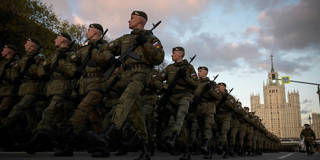Behind Vladimir Putin’s war on Ukraine is a neo-imperial vision that many Russian elites share: to make Russia great again by reversing the results of the collapse of the Soviet Union. The fact that Russia lacks the means to achieve this will not stop it from pursuing its goal to the bitter end.
BERLIN – Russia’s full-scale invasion of Ukraine on February 24, 2022, changed everything for Ukraine, for Europe, and for global politics. The world entered a new era of great-power rivalry in which war could no longer be excluded. Apart from the immediate victims, Russia’s aggression most concerned Europe. A great power seeking to extinguish an independent smaller country by force challenges the core principles upon which the European order of states has organized itself for decades.
Russian President Vladimir Putin’s war stands in stark contrast to the self-dissolution of the Warsaw Pact and the Soviet Union, which occurred in a largely non-violent manner. Since the “Gorbachev miracle” – when the Soviet Union started pursuing liberalizing reforms in the 1980s – Europeans had begun to imagine that Immanuel Kant’s vision of perpetual peace on the continent might be possible. It was not.
The problem was that many Russian elites’ interpretation of the globally significant events of the late 1980s could not be more opposed to Kant’s idea. They saw the demise of the great Russian empire (which the Soviets had recreated) as a devastating defeat. Though they had no choice but to accept the humiliation, they told themselves they would do so only temporarily until the balance of power had changed. Then the great historical revision could begin.

BERLIN – Russia’s full-scale invasion of Ukraine on February 24, 2022, changed everything for Ukraine, for Europe, and for global politics. The world entered a new era of great-power rivalry in which war could no longer be excluded. Apart from the immediate victims, Russia’s aggression most concerned Europe. A great power seeking to extinguish an independent smaller country by force challenges the core principles upon which the European order of states has organized itself for decades.
Russian President Vladimir Putin’s war stands in stark contrast to the self-dissolution of the Warsaw Pact and the Soviet Union, which occurred in a largely non-violent manner. Since the “Gorbachev miracle” – when the Soviet Union started pursuing liberalizing reforms in the 1980s – Europeans had begun to imagine that Immanuel Kant’s vision of perpetual peace on the continent might be possible. It was not.
The problem was that many Russian elites’ interpretation of the globally significant events of the late 1980s could not be more opposed to Kant’s idea. They saw the demise of the great Russian empire (which the Soviets had recreated) as a devastating defeat. Though they had no choice but to accept the humiliation, they told themselves they would do so only temporarily until the balance of power had changed. Then the great historical revision could begin.